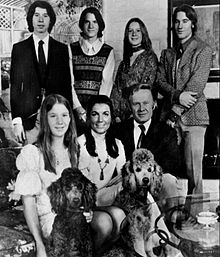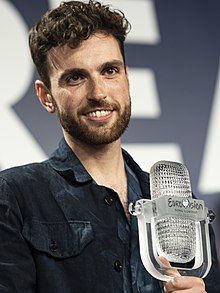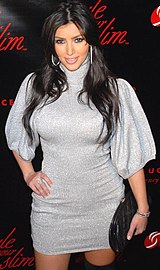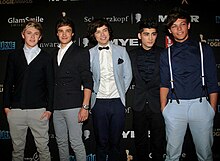Reality television
Other criticisms of reality television shows include that they are intended to humiliate or exploit participants; that they make stars out of untalented people unworthy of fame, infamous figures, or both; and that they glamorize vulgarity.[citation needed] The series The American Sportsman, which ran from 1965 to 1986 on ABC in the United States,[7][8] would typically feature one or more celebrities, and sometimes their family members, being accompanied by a camera crew on an outdoor adventure, such as hunting, fishing, hiking, scuba diving, rock climbing, wildlife photography, horseback riding, race car driving, and the like, with most of the resulting action and dialogue being unscripted, except for the narration.The success of Real People was quickly copied by ABC with That's Incredible, a stunt show produced by Alan Landsburg and co-hosted by Fran Tarkenton; CBS's entry into the genre was That's My Line, a series hosted by Bob Barker.[14] COPS, which first aired in the spring of 1989 on Fox and was developed due to the need for new programming during the 1988 Writers Guild of America strike,[15] showed police officers on duty apprehending criminals.The series Nummer 28, which aired on Dutch television in 1991, originated the concept of putting strangers together in a limited environment for an extended period of time and recording the drama that ensued.Nummer 28 also pioneered many of the stylistic conventions that have since become standard in reality television shows, including extensive use of soundtrack music and the interspersing of events on screen with after-the-fact "confessionals" recorded by cast members, which serve as narration.(All but four of these franchises, Top Model, Project Runway, The Biggest Loser and Dragons' Den, were created by either British producers or the Dutch production company Endemol.Season-long competitions, such as The Amazing Race, Survivor, and America's Next Top Model generally perform more poorly and usually must be rerun in marathons to draw the necessary viewers to make it worthwhile.[40][41] Due to their quicker turnaround times, the U.S. networks used reality series and other unscripted content (including those delayed from their summer lineups) to fill gaps in their schedules while the production of scripted programming resumed.Laguna Beach had a more drama-like feel than any previous reality television show, through the use of higher-quality lighting and cameras, voice-over narration instead of on-screen "confessionals", and slower pacing.The producers of The Only Way Is Essex and Made in Chelsea have admitted to coaching cast members on what to say in order to draw more emotion from each scene, although they insist that the underlying stories are real.The franchise has an older cast and different personal dynamics than that of Laguna Beach and its imitators, as well as lower production values, but similarly is meant to resemble scripted soap operas – in this case, the television series Desperate Housewives and Peyton Place.A notable subset of such series focus on a group of women who are romantically connected to male celebrities; these include Basketball Wives (2010), Love & Hip Hop (2011), Hollywood Exes (2012), Ex-Wives of Rock (2012) and WAGS (2015).Many shows focus on wealth and conspicuous consumption, including Platinum Weddings, and My Super Sweet 16, which documented huge coming of age celebrations thrown by wealthy parents.Shows that portray a set of people in the same line of work, occasionally competing with each other, include Deadliest Catch, Ice Road Truckers and Million Dollar Listing Los Angeles and its spinoffs.For example, the syndicated program Cheaters purports to use hidden cameras to record suspected cheating partners, although the authenticity of the show has been questioned, and even refuted by some who have been featured on the series.In general, the shows follow similar stylized patterns of night vision, surveillance, and hand held camera footage; odd angles; subtitles establishing place and time; desaturated imagery; and non-melodic soundtracks.Other examples include The Apprentice (which judges business skills); Hell's Kitchen, MasterChef and Top Chef (for chefs), The Great British Bake Off (for bakers), Shear Genius (for hair styling), Project Runway (for clothing design), Top Design and The Great Interior Design Challenge (for interior design), American Dream Builders (for home builders), Stylista (for fashion editors), Last Comic Standing (for comedians), I Know My Kid's a Star (for child performers), On the Lot (for filmmakers), RuPaul's Drag Race (for drag queens), The Shot (for fashion photographers), So You Think You Can Dance (for dancers), MuchMusic VJ Search and Food Network Star (for television hosts), Dream Job (for sportscasters), American Candidate (for aspiring politicians), Work of Art (for artists), Face Off (for prosthetic makeup artists), Ink Master and Best Ink (for tattoo artists), Platinum Hit (for songwriters), Top Shot (for marksmen) and The Tester (for game testers).Reality television shows that have been accused of, or admitted to, deception include The Real World,[79][80][81] the American version of Survivor,[82] Joe Millionaire,[83] The Hills, A Shot at Love with Tila Tequila,[84] Hogan Knows Best,[85] Extreme Makeover: Home Edition,[86] The Bachelor and The Bachelorette,[87][88] Pawn Stars,[89] Storage Wars,[90] Squid Game: The Challenge and Keeping Up with the Kardashians.[96] In 2007, Abu Dhabi TV began airing Million's Poet, a show featuring Pop Idol-style voting and elimination, but for the writing and oration of Arabic poetry.[104] However, Eko Nugroho, reality-show producer and president of Dreamlight World Media, insists that these reality shows are not promoting American lifestyles but rather reaching people through their universal desires.Reality TV participants who have become television hosts and personalities include Nabilla Benattia, Rachel Campos-Duffy, Kristin Cavallari, Colby Donaldson, Raffaella Fico, Elisabeth Hasselbeck, Katie Hopkins, Rebecca Jarvis, Jodie Marsh, Heidi Montag, Tiffany Pollard and Whitney Port; some of them have had acting careers as well.Reality TV participants who have become television personalities as well as successful entrepreneurs include Gemma Collins, Lauren Conrad, Jade Goody, Bethenny Frankel and Spencer Matthews.In Australia, various reality TV personalities have later served as radio hosts, including Fitzy and Rachel Corbett from Big Brother,[110] Mick Newell from My Kitchen Rules,[111] Heather Maltman from The Bachelor,[112] and Sam Frost from The Bachelorette.The prime example is former U.S. President Donald Trump: his stint as host of the original The Apprentice from 2004 to 2015 has been credited by some commentators as a factor in his political success, since it greatly increased his fame, and showcased him as a tough and experienced authority figure.Dragons' Den investors who have gone on to hold political office after appearing on their country's version of the program include Tommy Ahlers of Denmark, Nir Barkat of Israel, Anne Berner of Finland, Tomio Okamura of the Czech Republic, and Lencke Wischhusen of Germany.In a rare case of a previously unknown reality television alumnus succeeding in the political arena, The Real World: Boston cast member Sean Duffy was a U.S. Representative from Wisconsin from 2010 to 2019.(2003), The Naked Brothers Band (2006), Summer Heights High (2007), Parks and Recreation (2009), Modern Family (2009), Come Fly with Me (2010), Real Husbands of Hollywood (2013), Trial & Error (2017) and Abbott Elementary (2021)."[148] The mumblecore film genre, which began in the mid-2000s, and uses video cameras and relies heavily on improvisation and non-professional actors, has been described as influenced in part by what one critic called "the spring-break psychodrama of MTV's The Real World".Mumblecore director Joe Swanberg has said, "As annoying as reality TV is, it's been really good for filmmakers because it got mainstream audiences used to watching shaky camerawork and different kinds of situations.





CBS RealityReality Show (disambiguation)television programmingThe Real WorldSurvivorBig Brotherfranchises.Documentariestelevision newssports televisiontalk showsgame showshidden cameracourt showsfaced significant criticismAllen FuntCandid CameraPaul NipkowcensorshipQueen for a DayCash and CarryThe Candid MicrophoneTed Mack'sOriginal Amateur HourArthur Godfrey's Talent ScoutsBeat the ClockTruth or ConsequencesConfessionCulver City, CaliforniaYou Asked for ItUnited KingdomGranada TelevisionSeven Up!Up SeriesThe American Sportsmanhuntingfishingscuba divingDirect CinemaChelsea GirlsAndy WarholRadio Timesthe BeatlesLet It Behomonymous filmPeter JacksonAn American Familynuclear familyThe FamilyReadingChuck BarrisThe Dating GameThe Newlywed GameThe Gong ShowThe Big TimeSheena EastonLiving in the PastIron AgeGeorge SchlatterReal PeopleThat's IncredibleAlan LandsburgFran TarkentonThat's My LineBob BarkerCanadianThrill of a LifetimeMiss UniverseShawn WeatherlyEmmy Award1988 Writers Guild of America strikecamcordercinéma véritételevision documentaryYearbookseniorsGlen Ellynbroadcast prime-timeNummer 28The Truman ShowCharlie Brookernon-linear editing systemsAvid TechnologySylvania WatersO. J. Simpson murder caseKim KardashianRobert KardashianExpedition RobinsonSwedenChanging Roomsself-improvementmakeoverStreetmateGabe SachsTiger Aspect ProductionsStrictly Come DancingLocation, Location, LocationMasterCheftabloid talk showsThe Amazing Raceserial drama of the same nameThe MoleAmerican Idol2001–02American television ratings2003–20042010–2011The 1900 HouseBad Lads' ArmyThat'll Teach 'EmVictorian FarmJohn de Mol Jr.Fear FactorThe VoiceStar AcademyThe X FactorThe Biggest LoserCome Dine with MeGot TalentTop ModelProject RunwayDancing with the StarsDragons' Denreality game showsDeal or No DealWho Wants to Be a Millionaire?